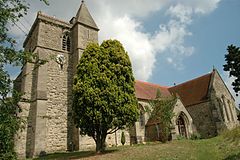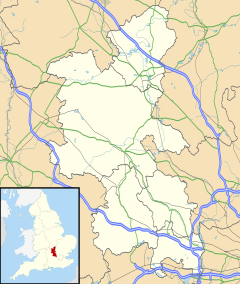Stone with Bishopstone and Hartwell
| Stone | |
|---|---|
 St John the Baptist parish church, Stone |
|
| Stone shown within Buckinghamshire | |
| Population | 2,587 (2011 Census) |
| OS grid reference | SP783123 |
| Civil parish |
|
| District | |
| Shire county | |
| Region | |
| Country | England |
| Sovereign state | United Kingdom |
| Post town | AYLESBURY |
| Postcode district | HP17 |
| Dialling code | 01296 |
| Police | Thames Valley |
| Fire | Buckinghamshire |
| Ambulance | South Central |
| EU Parliament | South East England |
| UK Parliament | |
Stone is a village in Buckinghamshire, England. It is located southwest of the town of Aylesbury, on the A418 road that links Aylesbury to Thame. Stone with Bishopstone and Hartwell is a civil parish within Aylesbury Vale district and also incorporates the nearby settlements of Bishopstone and Hartwell.
The architect Clough Williams-Ellis designed the village hall in 1910.
The village name is Anglo Saxon in origin, and refers literally to boundary stone or marker stone. In the Domesday Book of 1086 the village was recorded as Stanes.
The village of Stone adjoins the village of Hartwell.
The parish church (www.stonedintonhartwell.com) is dedicated to St John the Baptist, and is dated 1273. The graveyard contains the grave of Admiral Smyth.
In 1806, Magna Britannia described Stone as
In 1839, John Lee and the Royal Astronomical Society jointly owned the advowson of the parish. They appointed amateur scientist the Rev. Joseph Bancroft Reade as vicar. Reade served as incumbent until 1859, establishing a school and an astronomical observatory, and performing pioneering work in the early development of photography.
Stone Church of England Combined School is voluntary controlled, mixed primary school with approximately 180 pupils aged between four and eleven. The school's catchment area includes the nearby villages of Bishopstone and Hartwell, and children transfer to the school from Dinton Church of England School, at the age of seven. The school dates from 1871, but most of the present buildings date from 1973 when a major programme of building work provided a hall, new classrooms, a library, changing rooms, offices and an extended playground. The current headteacher is Simon Rose who took over from Ian Stewart in September 2006. The school has been gradually improving in the last few years, since Ofsted judged it to have "serious weaknesses" in November 2000. In 2006 the school was judged to be "satisfactory" and a 2007 Monitoring Report identified "good progress" in improving the curriculum and teaching. In 2007 the school's Key Stage 2 results matched the England average, although they were slightly below the average for Buckinghamshire.
...
Wikipedia

